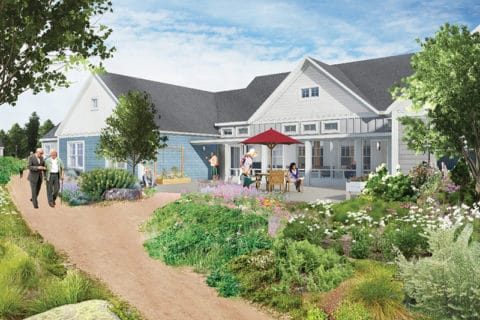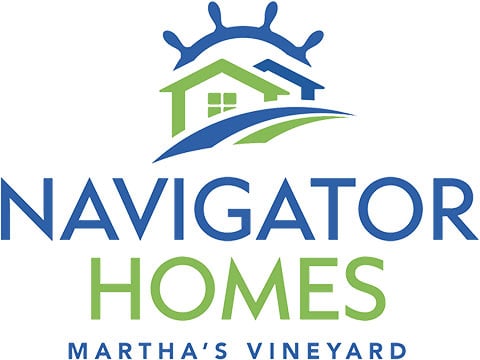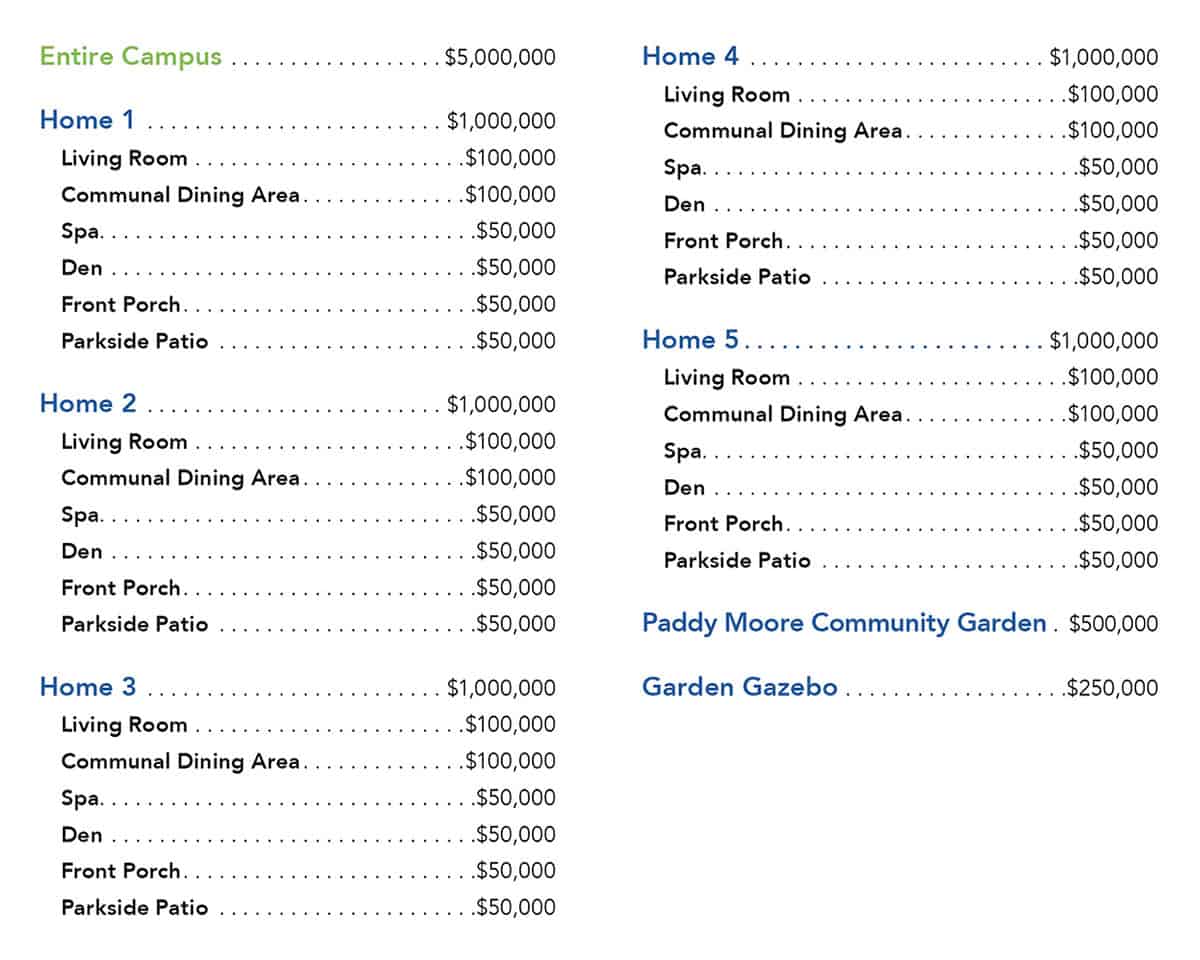The Martha’s Vineyard Commission voted to approve the Navigator Homes project, with conditions, during a Thursday evening meeting. The project will still need to receive permitting from relevant Edgartown boards and state departments.
Navigator Homes is slated to be built in Edgartown, and replace the current Windemere Nursing & Rehabilitation Center, the only nursing home on Martha’s Vineyard. The project was defined as a Green House Model, “which seeks to redefine residential care and give elders the privacy they deserve, as well as the support they rely on.” It is planned to have 66 beds for senior residents, and 48 workforce housing units with 76 beds, 14 of which (30 beds) will be for Navigator Homes employees and 38 beds for Martha’s Vineyard Hospital employees. There will be 28 beds for visiting staff at the hospital during the first two years, but after five years, housing for visiting staff will be phased out. Workforce housing occupants will be selected with help from the Dukes County Regional Housing Authority. The rates for senior residents on the 26-acre lot on 490 Edgartown Road, subdivided in half between Navigator Homes and Martha’s Vineyard Hospital, will depend on their health insurance. Expected daily rates are $328 for Medicaid residents, $689 for Medicare residents, and $515 for private-pay residents. Worker household rents will be based on household income.
Windemere is owned by Martha’s Vineyard Hospital. Marissa Lefebvre, the hospital spokesperson, did not immediately have Windemere’s rates, and said she would reach out to The Times after getting the information.
According to a survey done by Healthy Aging Martha’s Vineyard, individuals 65 years and older are a demographic that continues to grow annually on the Island. More recently, the UMass Rural Scholars identified various needs for older adults.
Navigator Homes had several conditions based on recommendations the land use planning subcommittee (LUPC) made in collaboration with the Edgartown board of health for the commission. The project will need to install “approximately 14 NitROE denitrifying septic systems in the Sengekontacket Pond watershed” to “mitigate excess nitrogen generated by the project.” The project is estimated to generate 66.92 kg over the property’s limit per year. Nitrogen-level data from these septic systems and monthly occupancy records will be monitored under the supervision of the commission and the Edgartown board of health. The property will also be built with sustainability in mind, using such items as solar power and recycling bins. There are also requirements Navigator Homes must meet before receiving a certificate of occupancy, such as making a proposal to build a walking trail connecting Pennywise Path and Edgartown–Vineyard Haven Road that would be reviewed by the LUPC and subject to review by the state’s Natural Heritage and Endangered Species Program, and a final landscape plan, also to be reviewed by the LUPC.
A document that sparked debate among the commission members was the main “benefits and detriments” of Navigator Homes. MVC commissioner Michael Kim, who spent the past six months enrolling his parents in a skilled nursing facility, said he was “having a very hard time with” the rates. He pointed out that the “affordable option” costs around $120,000 a year, and the self-pay option is “twice as much.”
“This place is going to fill up, because when we looked around, a quarter-million dollars a year ain’t at the top of the barrel, and all the places at the top of the barrel have waiting lists,” Kim said, underscoring despite how people have sent letters stating Navigator Homes is “good for the community,” he has a “hard time seeing how the median person who lives on the Island can have any benefit from this, because they’re not touching this.”
“I’m not sure that we have to find that the benefit accrues to everyone,” commission chair Joan Malkin said, pointing out that the hospital has stated Navigator Homes will be “oversubscribed,” and is meeting a demand.
Kim still questioned the value of the project, and made a comparison to the “demand of $5 million homes.” Malkin said the demand for Navigator Homes is different from the expensive houses, and repeated her earlier point about the hospital’s statement.
“I agree with you, it’s not as great a benefit to the Island as it might be … if several of those spaces were reserved for low-income. But that’s not the fact, and I’m not sure it means there’s not a benefit being added,” she said.
Tisbury commissioner Ben Robinson said he thought Kim was making “important points” that shouldn’t be glossed over.
“It’s a new industry, is what you can call it. Jesus, for $10,000 a month I’d rather move to The Charlotte Inn,” Tisbury commissioner Clarence (“Trip”) Barnes said.
LUPC chair Doug Sederholm said to his understanding, once someone is on MassHealth, which is the state’s program that encompasses Medicaid, “there ain’t nothing coming out of your pocket if you’re in skilled nursing. It’s paid for by MassHealth.”
Oak Bluffs commissioner Brian Smith said for future projects similar to Navigator Homes, people who are interested should look into financial planning and trusts, to “save a heck of a lot more money in nursing home care if they set up different trusts to save their assets.”
After more discussion, Malkin said after hearing what was said, she is ready to move on with the consensus that Navigator Homes is still a “strong benefit,” albeit not unanimous.
The commission also went through several other qualities about the project, such as water quality impact (neutral because of mitigation measures), it having a “suburban” quality in the rural area (Smith and others said this is a detriment to the rural area), and the safety and health provided by the project (benefit).
Robinson said the Island can’t build itself out of the housing crisis, and alternative methods need to be considered.
Aquinnah commissioner Kathy Newman added the decision must also be made with practicality in mind.
Ultimately, the commission voted 14-1 to accept the project as proposed, with the offers noted and slightly amended conditions imposed. Smith was the sole dissenting vote.
In other business, the commission held a continued public hearing for the Stillpoint project in West Tisbury. Overall, it received positive feedback from those who spoke, although Edward O’Neal, who owns the mill and the Mill House across Crocker Pond, was concerned about the environmental impact the project could have, particularly with the weddings that are part of the plans. The commission closed the public hearing, and will leave the written record open until Monday, Nov. 28, at 5 pm.
The commission will be conducting a joint study with Nantucket, the U.S. Army Corps of Engineers Research and Development Center, and the Massachusetts Office of Coastal Zone Management on water-related issues and the supply chain for the Islands. Martha’s Vineyard Commission executive director Adam Turner said the Wampanoag Tribe of Gay Head (Aquinnah) will also be providing support to the study.



 Please check with the Navigator Development Consultant at 610-246-3488 to confirm availability or adjustments. Named gift opportunities are subject to change.
Please check with the Navigator Development Consultant at 610-246-3488 to confirm availability or adjustments. Named gift opportunities are subject to change.